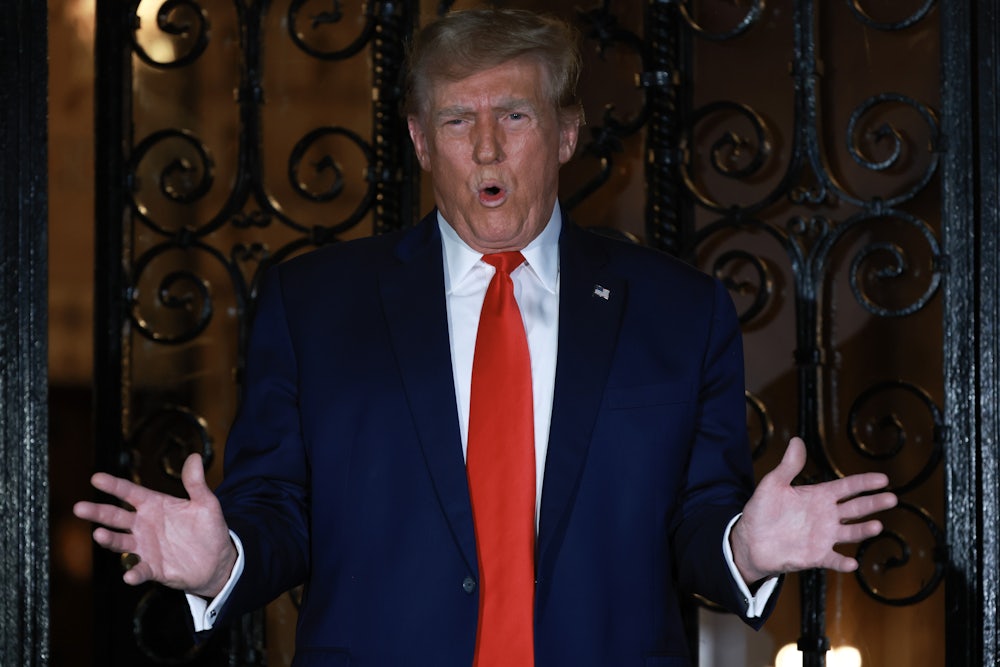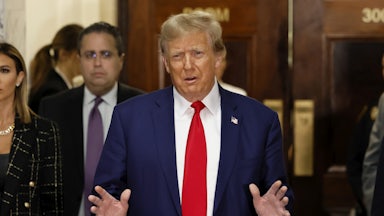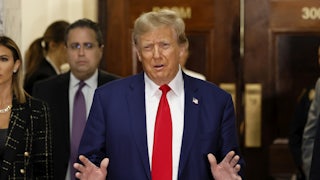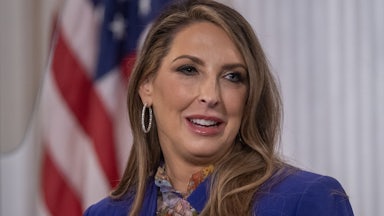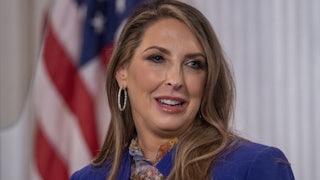The news about the eye-popping $355 million judgment against Donald Trump Friday minimized or even missed the real story in the judge’s richly detailed ruling.
In justifying his findings of fact, New York Judge Arthur Engoron’s analysis of testimony in Trump’s seven-week civil fraud trial in Manhattan showed how everything Trump does is based on consistent and shameless cheating, deceiving, falsifying documents, and lying.
The 92-page ruling establishes that Trump isn’t a business genius, a modern Midas who turns everything he touches to gold. Instead, the former TV entertainer and real estate mogul is simply a crook, a white-collar thief who uses flattery, threats, lies, and an ink pen to rip off everyone he can, particularly banks and insurance companies. Engoron’s opinion provides a road map to understanding Trump’s outrageous behavior and thus what we should expect from a second Trump administration.
Trump, to use his words, does “whatever the hell” he wants. Trump is just being true to himself, whether cheating his niece Mary out of most of her inheritance; sexually assaulting women like E. Jean Carroll; making up lies about Carroll in hopes of discrediting her; or tricking banks, insurance companies, and our government into valuing his properties in ways that stuff greenbacks into his pockets.
All but one Trump witness lacked credibility, and many outright lied, Engoron showed. He meticulously dissected dozens of lies told at trial not just by Trump, his three oldest children, and two Trump Organization executives but by a host of supposedly expert witnesses paid as much as a whopping $960,000 to testify on Trump’s behalf.
It’s as if Trump has a magic wand that prompts those around him to lie on command, sometimes out of a desire to remain close to him, and even in a few instances willingly going to jail for him. That’s an ability that, perversely, has made me admire Trump’s skills since we first spoke in 1988, and that is why I call him the greatest con artist in world history.
The judge’s opinion is a sequel to Trump’s 1987 autobiography, The Art of The Deal, in which he brags about cheating at golf, deceiving business partners, and thumbing his nose at the law. That book is a guide not just to Trump’s megalomaniacal ego but to how he serially ripped off unsuspecting people and then moved on to the next victim. This strategy worked until Trump became president, which bathed him in the unwanted glare of the sunlight that Justice Louis Brandeis called “the best disinfectant.”
Trump brags about what a great dealmaker he is. But at a time when a first-rate ghostwriter cost perhaps $50,000 and a bonus for every week a book made the New York Times bestseller list, Trump instantly accepted ghostwriter Tony Schwartz’s request for half the royalties, money that made Schwartz a wealthy man before he started donating his half to charity.
Trump boasts that he hires “all the best people.” But consider the testimony of Steven Laposa, paid about $276,000 as an expert in “real estate research.” The judge found that Laposa “had no experience preparing or revealing personal financial statements” and “no knowledge of the types of valuations or methods that Trump used to value his assets” and knew virtually nothing about real estate appraisal.
Jeff McConney, Trump’s no. 2 money man and a defendant, gave testimony the judge found impossible to believe. For example, “McConney was aware that Donald Trump had no right to withdraw funds” from a partnership with the big real estate firm Vornado. Yet McConney showed these funds in Trump’s Statements of Financial Condition as readily available cash.
Those statements were not audited statements requiring careful review but mere compilations of what Trump and his confederates told the Mazars USA accounting firm. Mazars has since renounced the compilations as unreliable.
Then there’s Trump’s insurance broker and frequent golfing companion, Gary Giulietti. He adopted Trumpian terms in describing himself: “I don’t think there are four people in America that have my qualifications to do what I do.” Giulietti testified that Zurich Insurance Group “would pay no credence” to Trump’s fanciful financial statements because it used “airballs and witchcraft” to analyze risk. But two other witnesses and documents established that Giulietti’s testimony was nonsense.
Giulietti received $1.2 million in commissions from the Trump Organization. He added that he hadn’t billed for his testimony because he anticipated that payment “would be included in our overall relationship year over year.” That drew an extraordinary judicial rebuke. Engoron wrote that in more than two decades as a judge, he had “never encountered an expert witness who not only was a close personal friend of a party, but also had a personal financial interest in the outcome of the case for which he was being offered as an expert.”
Thanks to Forbes magazine reporter Dan Alexander’s articles and an audio recording, Trump was caught repeatedly lying in his financial statements and putting forth witnesses who the judge found knowingly lied for Trump.
Trump’s financial statements showed an office building known as 40 Wall Street was 72 stories when it was only 63, inventing $50 million of bogus value, and showed $64 million of net operating income when it was almost $9 million in the red, as Alexander showed.
Finally, take this in as a measure of Trump’s brazenness. Last November, Engoron named retired Judge Barbara Jones to oversee the Trump Organization as a court-appointed monitor. Yet even after that, Engoron wrote, improper financial movements continued. What better proof of brazen lawlessness than Trump engaging in improper money movements under the nose of the court-appointed monitor?
Maybe that’s why Engoron also ordered that an “Independent Director of Compliance” oversee the Trump Organization “for a few years.” That language suggests the oversight may continue beyond the three years during which the judge banned Trump from running his company.
Compounding all this, the judge noted, is a “complete lack of contrition and remorse [that] borders on pathological. They are accused only of inflating asset values to make more money. The documents prove this over and over again. This is a venial sin, not a mortal sin. Defendants did not commit murder or arson. They did not rob a bank at gunpoint. Donald Trump is not Bernard Madoff. Yet, defendants are incapable of admitting the error of their ways. Instead, they adopt a ‘See no evil, hear no evil, speak no evil’ posture that the evidence belies. This Court is not constituted to judge morality; it is constituted to find facts and apply the law.”
Protecting “the integrity of the financial marketplace and, thus, the public as a whole,” the judge wrote, is made all the more difficult by the Trump team’s “refusal to admit error—indeed, to continue it.” This shows that Team Trump will engage in fraud “going forward unless judicially restrained. Indeed, Donald Trump testified that, even today, he does not believe the Trump Organization needed to make any changes based on the facts that came out during this trial.”
The message from Engoron’s opinion should carry over into whether to entrust Donald Trump once again with the presidency’s powers. People who want a man in the White House who thumbs his nose at the law, has no remorse for cheating others, and lies as easily as he breathes should vote for him. But now that a judge has laid bare Trump’s unrelenting dishonesty, hopefully the American public will realize that Donald Trump is nothing but a remorseless con artist who would steal our democracy and then brag about what a great job he did preserving it.
